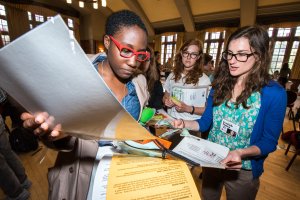
We hear a lot about the social safety net in America -- a patchwork of government programs that in theory help support individuals in our nation in need of temporary assistance and put them on a path toward economic mobility. But how does it actually work? Who does it catch and who does it leave behind? How do low-income families and individuals engage with the system while trying to meet their everyday basic needs?
This Poverty Simulation is a three-hour hands-on engaged learning experience for students to gain a deeper understanding of what it takes to feed a family, pay bills, find employment, and navigate the complex challenges of the U.S. social safety net. The goal is for students to gain a better understanding of our current system, reflect on how U.S. policies help or hinder those most in need, and identify opportunities to take action toward a more just and equitable system.
Participants are given scripted role assignments and structured situations that represent those that welfare recipients face daily. Participants interact with volunteers who staff a community of stores and agencies including welfare office workers, grocers, pawnbrokers, food pantry personnel, bill collectors, police, and employment interviewers. After a “month on welfare” (about one hour) a facilitator leads a discussion based on the event. Participants describe their experiences, volunteer staff share their insights and the facilitator offers suggestions for how participants can take action to promote justice for those living in actual poverty.
Poverty Solutions is partnering with the Interfaith Council for Peace and Justice to host the event.
Sing up here: https://docs.google.com/forms/d/e/1FAIpQLSeAbXg4R1rJu-gMdMqO07t9F7WNPifWzZcQTfL5lnWBEiK9mQ/viewform
Contact Poverty Solutions student engagement coordinator Trevor Bechtel for more information: betrevor@umich.edu
This Poverty Simulation is a three-hour hands-on engaged learning experience for students to gain a deeper understanding of what it takes to feed a family, pay bills, find employment, and navigate the complex challenges of the U.S. social safety net. The goal is for students to gain a better understanding of our current system, reflect on how U.S. policies help or hinder those most in need, and identify opportunities to take action toward a more just and equitable system.
Participants are given scripted role assignments and structured situations that represent those that welfare recipients face daily. Participants interact with volunteers who staff a community of stores and agencies including welfare office workers, grocers, pawnbrokers, food pantry personnel, bill collectors, police, and employment interviewers. After a “month on welfare” (about one hour) a facilitator leads a discussion based on the event. Participants describe their experiences, volunteer staff share their insights and the facilitator offers suggestions for how participants can take action to promote justice for those living in actual poverty.
Poverty Solutions is partnering with the Interfaith Council for Peace and Justice to host the event.
Sing up here: https://docs.google.com/forms/d/e/1FAIpQLSeAbXg4R1rJu-gMdMqO07t9F7WNPifWzZcQTfL5lnWBEiK9mQ/viewform
Contact Poverty Solutions student engagement coordinator Trevor Bechtel for more information: betrevor@umich.edu